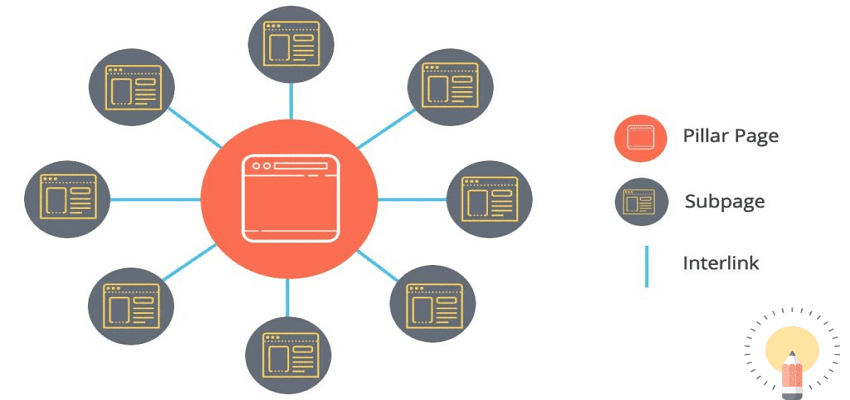Revealer Info
https://www.revealerinfo.com/2022/02/content-hub.html
The Ultimate Guide: Content Hubs for SEO 2024
The goal of this tutorial is to assist you in creating SEO content hubs that will boost your SaaS's ranks and produce more organic traffic and leads.
But, before I tell you anything about this incredible content marketing plan, we need to quickly discuss a larger issue: topical authority as an essential prerequisite for ranking.
In the "good old days," we just needed two things to rank: a well-optimized website and a slew of links.
Sure, getting to page one of the SERPs was still difficult. But, at the very least, the procedure was straightforward.
Today's search engines are absurdly intelligent. They understand what searchers are looking for. They comprehend the context and meaning of each inquiry, and they excel at returning the most relevant results.
What is a Content Hub in an SEO Strategy?
A content hub can be thought of as a consolidated resource on a given subject.
Consider a content hub to be a content library with a collection of pages that, when combined, contain practically everything a person needs know about a certain subject and are arranged to make it easy to discover the material.
If we were to exhibit a content center visually, it would look something like this:
Content hubs are made up of three main components:
A pillar page is located in the core of the hub. It's what I call the "master" resource and introduction to the subject. It's a high-level overview of the issue, and the page is usually a good starting place for learning more about it.
The spoke content surrounds the pillar page (sometimes referred to as subpages or cluster content). Individual guides – blog articles or long-form literature – that concentrate on various parts of the subject are available.
All of these elements are linked together with internal hyperlinks to lead users through the subject until they've exhausted all accessible resources and learned all of the necessary information.
1. Content Hubs Increase Your Topical Authority
This was briefly mentioned in the introduction. You are aware that search engines currently place a high value on topical relevance and prefer websites that they believe to be authoritative.
In summary, if Google and other search engines perceive you as an authoritative resource, your material will be more likely to rank highly in SERPs for relevant keywords.
(And this is frequently true even if you don't have a high enough domain authority or a large enough number of links going to a page.)
Here's how content hubs aid in the development of subject relevancy:
A content hub, by definition, has extensive knowledge about a certain subject. As a result, Google is quickly convinced that the domain is an expert on the issue.
Interlinking information in the hub also generates semantic linkages between those sites, which SEOs feel helps with on-page SEO score growth (you can call authority).
2. Strength the Link Authority of all its Pages
This is due to the fact that connecting the pillar and spoke content would assist disperse link juice across all of those sites. Even if just one page in the hub begins to get new connections, other hub assets will benefit instantly. How? Because the newly obtained link authority will be sent via internal connections to other speak sites.
It operates as follows:
As an outcome, hub page sites have considerably higher link authority, better ranks, and more organic traffic.
3. Improved Engagement Metrics
Because content hubs are comprehensive resources on a subject, with material spread over several sites, they:
- Keep your target audience on a page for a longer period of time.
- Reduce bounce rates and drop-offs.
- Increase the amount of time a visitor spends on the site and the number of pages they read throughout their stay. Increase repeat visits.
All of these results convey strong engagement signals to search engines, reassuring them of the quality and utility of your information to a reader.
4. Strong brand recognition
This isn't a direct SEO boost. However, it's also a fantastic one.
As you can see, content hubs help your brand tremendously.
Consider this: no matter what part of a subject your prospective consumer is interested in learning more about, they will ultimately come across your content center.
They can come upon the pillar page or any subpages and begin their trip through the hub from there.
Assuming you've met their expectations, they'll have a favorable opinion of your company.
5. Select Topic for the Pillar Page
From my experience, this stage often generates the biggest issues for entrepreneurs and marketers. Because, how do you choose a subject that will perform well as a pillar page while also having a lot of opportunity for developing spoke content?
To begin, a suitable subject for a content hub should have three characteristics:
An informative purpose
Content hubs perform best when they are focused on providing information. This suggests that individuals looking for the issue want to learn more about it rather than buy a solution (commercial aim) or locate a particular location (a local intent.)
These folks want knowledge, which is why a huge pillar page may pique their interest.
However, in order for this to happen, the issue must meet another criterion:
It makes sense to target the subject with the content hub if people are looking for it.
For example, "instagram marketing for female" may seem to be an ideal subject for a content hub. Many individuals would want to start instagram influence marketing and would benefit from tips on how to start marketing, stretch their company so early, and prepare for the run, among other things.
However, a short keyword search indicates that there is relatively little interest in the issue.
"Facebook Marketing," on the other hand, piques people's attention and has a higher traffic potential.
6. Choose Subtopics for Cluster Content
You identified a feasible subject for a content hub in the previous phase. You discussed various subtopics as part of the process to determine if the subject is big enough.
We need to go further into this study to determine which subtopics should be included in the hub.
There are numerous approaches you may use when selecting subtopics:
- Review top-ranking pages and content on the topic
- Keyword research, Keyword research and Keyword research
- Review question-based keywords only
- Review keyword categories
- Interlinking the pillar page with spoke content
Pro Tip: Use 'Ask the People' to find best QnA Keyword on any topic. This tool gets those keywords on blogs, forums and others qna site.




0 Comments
Please read our Comment Policy before commenting.